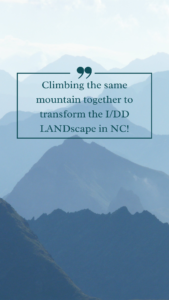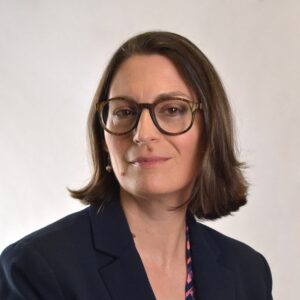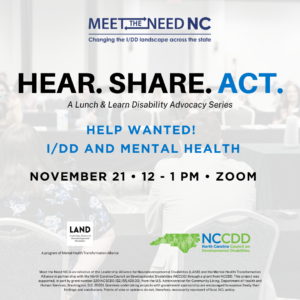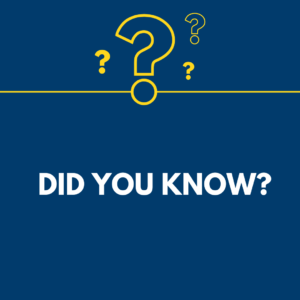
In this month’s edition of Meet The Need NC eNews:
- Message from LAND, the Backbone of Meet The Need NC
- October Lunch & Learn Wrap Up: Help Wanted! The I/DD Workforce Crisis – Part 2
- Register for the November’s HEAR. SHARE. Act. Lunch & Learn
- LENS: Lived Experience Network Speaks Blog
- Did you know? Information you can use!
- Let’s get social! Stay in touch with us on Facebook, Instagram and more!
Message from LAND, the Backbone of Meet the Need NC
Transforming the I/DD LANDscape in North Carolina
Solving the I/DD Workforce Crisis Together!

Our mission at Meet the Need NC is to meet the service and support needs of the individuals with intellectual and other developmental disabilities (I/DD) community in North Carolina. When it comes to being able to access the benefits of community living and receive services in the most integrated settings, we must look critically at our I/DD workforce crisis.
During our October monthly webinar, “Help Wanted! The I/DD Workforce Crisis, Part 2,” we asked webinar attendees about the workforce issues that were impacting them now. Overwhelmingly, we heard about the inability to find and keep staff to help in home-based settings. Some have been waiting for years. Also, there were comments about the inability to find medical specialists even when services are approved, especially when living in rural areas.
Our speaker and panelists confirmed that finding and growing a robust I/DD workforce for the years ahead in North Carolina is integral to being able to ensure community-based living as a true option for those who choose it. Read the October HEAR. SHARE. ACT. Lunch & Learn Recap below to learn what people said.
Our webinar panelists, who were people with I/DD lived experience, ventured into looking toward potential solutions. It is obvious we must look at the complex issue of growing a workforce to accommodate those who want to live in the community together.
And change must happen NOW if we are to achieve the promise of the Olmstead decision!
Elizabeth Field, M.S.
Program Director
Meet The Need NC is an initiative to change the intellectual and other developmental disabilities (I/DD) landscape across the state and is funded by the North Carolina Council on Developmental Disabilities. Meet The Need NC is driven by the Leadership Alliance for Neurodevelopmental Disabilities (LAND), a program of the 501c3 nonprofit, Mental Health Transformation Alliance (MHTA). Learn more about LAND at https://mentalhealthtransformationalli.godaddysites.com/land.
October HEAR. SHARE. ACT. Lunch & Learn Recap
Topic: Help Wanted! The I/DD Workforce Crisis
On October 17 2023, the topic of the Meet The Need HEAR. SHARE. ACT. Lunch & Learn webinar series was Help Wanted! The I/DD Workforce Crisis. This was the second of a two-part series on the need to understand that the workforce shortage is not just about Direct Support Professionals (DSPs) but also healthcare and disability services as a whole. This is a national crisis, and it is imperative that we work together in North Carolina on solutions. The presenter was Jennifer Mahan from the Autism Society of North Carolina along with a panel of individuals with I/DD who have lived experience: Jon D’Angelo, Sarah Potter, Benita Purcell, RV Kuser and Marlene Kuser.
Webinar Resources
- Watch the webinar recording
- Watch the Spanish version of the webinar recording
- View the slides from the presentation
- Answers to questions asked during the webinar
About the presenter

Jennifer Mahan has worked for the Autism Society of North Carolina since October of 2010. Her role includes legislative, grassroots, and one-on-one advocacy supporting ASNC’s public policy targets. Jennifer’s 30 years of experience in health and human services have focused on consumer advocacy, information and referral programs, and public policy related to developmental disabilities, mental health, addictive disease, health care, and low-income benefits programs. She has served as Chair of several statewide advocacy coalitions and currently serves as past chair the Developmental Disability Consortium, 30 organizations advocating for the rights, opportunities and responsibilities, of individuals with developmental disabilities; and as co-chair of the Public Policy Committee of The Coalition, 40 organizations advocating for the needs of individuals across developmental disabilities, addictive disease, and mental health disorders.
Register for the November Lunch & Learn Webinar!

Join us on the third Tuesday of every month at noon with new topics brought to you by thought leaders in the intellectual or other developmental disabilities (I/DD) community. Our next Lunch & Learn will be on November 21 from 12pm – 1pm. The topic is about the I/DD and Mental Health featuring Jill Hinton, PhD, Clinical Psychologist and Jennifer Mahan.
Register for the November Webinar
Throughout our monthly webinar series, Meet The Need NC aims to create a basic understanding of the unmet needs of those living with I/DD in North Carolina. For more information, including our 2024 webinar schedule. go to our Hear. Share Act. Webinar Schedule & Registration web page.
LENS: Lived Experience Network Speaks
LENS, which stands for Lived Experience Network Speaks, is a blog provided by Meet The Need NC from our LENS Advisory Group. LENS includes individuals with intellectual and/or developmental disabilities (I/DD) experience, including people with I/DD, families, and caregivers with separate groups for those who speak English or Spanish.
We provide a space for them to share freely, but these opinions do not necessarily represent those of Meet The Need NC or all members of the LENS Advisory Group.
Self-Directed: A Tool to Ease the DSP Workforce Crisis and Expand Independence
This month’s guest blogger is Jon D’Angelo.
 The spectrum of need within the intellectual and other developmental disabilities (I/DD) community is vast because the diversity of the I/DD community is vast. For some the need is behavioral, for others physical, and for some both. For decades the traditional model to deliver Home and Community Based Services (HCBS) has been through providers which are Medicaid contracted private organizations that recruit, train, supervise, and deploy Direct Support Professionals (DSP) into the homes and communities of those requiring services. This model works well, especially for those with a higher level of need requiring specialized training. However, this model has also struggled under DSP wage stagnation relative to inflation, and increased need within the community. The Self-Directed program, however, takes the success of HCBS and elevates a higher degree of autonomy while lightening the load on the traditional providers.
The spectrum of need within the intellectual and other developmental disabilities (I/DD) community is vast because the diversity of the I/DD community is vast. For some the need is behavioral, for others physical, and for some both. For decades the traditional model to deliver Home and Community Based Services (HCBS) has been through providers which are Medicaid contracted private organizations that recruit, train, supervise, and deploy Direct Support Professionals (DSP) into the homes and communities of those requiring services. This model works well, especially for those with a higher level of need requiring specialized training. However, this model has also struggled under DSP wage stagnation relative to inflation, and increased need within the community. The Self-Directed program, however, takes the success of HCBS and elevates a higher degree of autonomy while lightening the load on the traditional providers.
Self-Directed, available under both the North Carolina Community Alternatives Program for Disabled Adults (CAP/DA) and Innovations waivers, empowers families to reach out into their communities and find those willing and able to provide those services. Have a neighbor whose daughter is home from college and has known your kid with cerebral palsy since kindergarten? Under Self-Directed you can hire her. Is your coworker’s husband a retired nurse looking for something to do? Under Self-Directed you can hire him. Found someone on Facebook looking for a new career? Hire them.
Self-Directed makes the individual their own provider, responsible for hiring, training and supervising those you and your family trust. From the moment of diagnosis, natural supports are taught (often self-taught) to the family on how to meet their child with I/DD needs. And are done so, in many cases, better than the professionals. Those skillsets are transferable to Self-Directed DSPs who can learn from the true experts: the individual and the family. That underlines a major difference between the two models, when someone applies for the job, they aren’t applying to work for an agency, they are applying to work for me.
As someone with Spinal Muscular Atrophy, a developmental disability in the Muscular Dystrophy family, I have used the Self-Directed model since I was a freshman at East Carolina University, in addition to a traditional provider. My needs fall in the category of ‘total care’. The overwhelming majority of the DSPs I hired were fellow students, and in grad school they were in my graduate school cohort. These prior established deep personal connections not only enabled full independence, but also person-centered care which in turn enabled personal growth and confidence. Self-Directed also gave me a degree of stability because I knew who was going to knock on the door every day, and I knew when things went wrong, they’d be there to bail me out. Today college students are my go-to source for DSPs, they’re (in theory) smart, motivated, have their act together, teachable and also looking for extra money. Name a college major, I’ve probably hired one. With Self-Directed I can find them myself, train them myself and manage their schedule myself. No prior experience? Great, you’ll learn about me – my way. Self-Directed combined with a live-in arrangement can take things even further by maximizing flexibility around care routines, pop-up community events and creating a built-in safety net.
Self-Directed isn’t for everyone – it’s hard. Managing people is a skill, and firing people is extremely difficult. There are also no backups beyond what you set up yourself. In college at one point, I was managing a team of five DSPs, which combined with grad school was one of the most stressful periods of my life. But duct taped and strung together was a care system that at one point meant I didn’t see my parents for 33 days, which included a major illness. That care system enabled 4am study groups, bar crawls, and cohort beach trips: deep community engagement.
For those for whom it will work and willing to do it, Self-Directed takes pressure off traditional providers by allowing individuals to recruit people who wouldn’t even think of working for a DSP provider. For my brothers and sisters in diagnosis within the Muscular Dystrophy community, this is the model we preach to the new generation of transitioning youth. Especially for those going off to college, because some of the best potential DSPs are right in their dorm, and with Self-Directed, you can hire them. Just don’t panic if your kid is at a bar singing karaoke, they’ll be fine, promise!
About the author: Jon D’Angelo is a self advocate with a developmental disability on the CAP Choice waiver and the Innovations waiting list. He holds an MS in International Security Studies and a BS in Political Science, both from East Carolina. In addition to serving on the North Carolina Council on Developmental Disabilities, he works full time as a Market Specialist for an Employee Benefits Broker based in Atlanta.
Did you know? Information you can use!
Helpful Resources
 Inclusion Works: Inclusion Works, formerly called Competitive Integrated Employment Initiative (CIE), is a NCDHHS Initiative to promote CIE for individuals with I/DD.
Inclusion Works: Inclusion Works, formerly called Competitive Integrated Employment Initiative (CIE), is a NCDHHS Initiative to promote CIE for individuals with I/DD.
Legislative & Policy Update – NC Passes a State Budget: On September 22, 2023, the NC Senate and House passed the budget conference committee report for House Bill 259, the Appropriations Act for 2023-2025. Jennifer Mahan, Director of Public Policy with the Autism Society of North Carolina, provides a summary of the budget.
Medicaid Expansion Website, Toolkit and Sign-up Form: North Carolina’s Medicaid Division of Health Benefits launched a new website for Medicaid Expansion which will go into effect on December 1, 2023. The website includes a bilingual toolkit and a sign-up form to receive updates about Medicaid Expansion. Please share these tools with your networks and communities!
New NC Medicaid Dashboard for the Innovations Waiver Waitlist: NCDHHS has created an Innovations Waiver Waitlist Dashboard. The dashboard represents individuals on the Innovations Waiver Waitlist by county and by LME/MCO. Over time, NC Medicaid anticipates adding additional information to the dashboard to help better understand the population waiting for NC Innovations Waiver services. NC Medicaid will update the Innovations Waiver Waitlist dashboard with the previous month’s data by the 30th of each month.
Side by Side with DMH/DD/SUS Monthly Meetings: In September, the “Side by Side” group was launched. Led by NCDHHS, the group includes consumers, families, advisory groups, LME/MCOs, community members and partner organizations. The purpose of Side by Side is to help communities work together to better understand and improve systems for our I/DD community. The group meets monthly, and you can find the recordings and presentations of the meetings on their website.
Events
Importance of Voting
Friday, November 3rd from 2:00 – 3:00 PM
Register here
HOPE North Carolina is offering a chance to learn about voting as a person with a disability. The event will tell you:
- Why you should vote.
- Breakdown of what happens on voting day.
- Understanding ballots.
- Learning about the connection of voting and advocacy for people with disabilities.
Questions? Email Deja at deja@hopenorthcarolina.org.
Inclusive Housing Summit: A Roadmap to Inclusion
Monday, November 13th from 8:00 AM – 4:00 PM
Register here
HOPE North Carolina is working to create more inclusive housing options for people with disabilities in NC by hosting its second annual Inclusive Housing Summit. The summit is for individuals with disabilities, their caregivers, professionals, students and stakeholders who want to build inclusive communities. It will include an Exhibit Hall with Triangle organizations. This event will be held at the McKimmon Conference Center in Raleigh.
Delivering on Integration: Optimizing Connections
December 7-8, 2023 with Pre-conference sessions on December 6
Register here
This is the i2i Center for Integrative Health’s Winter Conference. Pre-conference day sessions will also be held:
- Pre-Con Symposium – Medicaid and Integrated Care: A Closer Look at Waivers, Transitions and Expansion from 10:00 AM to 4:30 PM
- Competitive Integrated Employment Summit – Valuing All Perspectives: from 1:30 PM to 4:30 PM (includes Lunch 12:00-1:30 PM)
Visit our Statewide Resources web page for more resources!
Let’s get social! Stay in touch with us on Facebook, Instagram and more!
Want to stay informed about issues that are important to you and your community? Follow us and subscribe to our newsletter! Here’s where to find us:
- Follow us on social media on Facebook and Instagram.
- View our Hear. Share. Act. webinar recordings and other video clips on our YouTube channel.
- Listen to our podcast, The Waiting Room, hosted by Kenneth Kelty.
- Visit our website for updates, resources and links to other helpful websites.
- Join our email list to receive upcoming webinar registration information and our monthly newsletter.
Most importantly … share this information! Encourage others to subscribe to our newsletter and follow us on social media so they, too, can be part of Meet The Need’s vision and mission to change the I/DD landscape across North Carolina through a common agenda. Together, we can make it happen!

